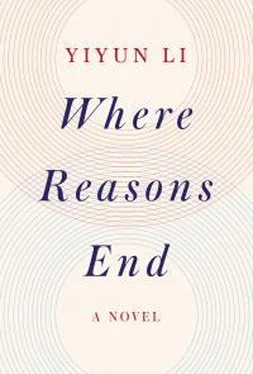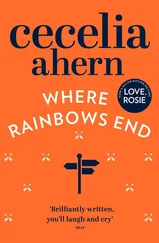I remember that, Nikolai said. I was eavesdropping on your conversation. I was feeling bad for you.
Nikolai was a good eavesdropper. Eavesdropping used to be a crime, I said.
I know, he said. I’ve been to your talk on eavesdropping more than once. Writing fiction is to eavesdrop on your characters’ hearts.
It occurred to me, when he said that, that I would not give another talk on eavesdropping again.
Why not?
You can’t carry everything from one life to the next, I said.
But why leave the good things behind? he said. I rather liked listening to you talk about eavesdropping.
More of a reason to leave it with you, I thought, just as I had sent him off with a silk scarf of mine, intense with blue and yellow, of Vincent van Gogh’s Starry Night. The scarf had been my favorite, and his, too.
Steal-listening, he said. An act of theft. Do you realize if I want I can do that even better now?
No doubt it’s the case, I thought. When was the last time you performed the act? I said.
At that lunch with your friend, remember?
I did not have to ask him the question to know that was the last time. On that day he had had a copy of Great Expectations open in front of him, but when my friend and I began a disagreement, he could not contain his smile. What were we arguing about? I said.
She asked you, in your imagination, what you wanted your novel to be. You said the main character outlived everyone so it was a book about the kindest revenge. She said that sounded cruel, and you said there was no cruelty, as the character had done nothing hurtful but to live on.
At that moment we had both turned to Nikolai, knowing he had been listening. What is your opinion, asked my friend, showing him the definition of the word revenge: to avenge by retaliating, to inflict injury in return for. And he had confirmed that yes, any revenge would be cruel.
You remember things well, I said.
If you can brag about your memory, why can’t I?
Things we remembered together, things we remembered differently, and things we remembered separately. Later that day I had taken him and his friend to the Empire State Building in a storm. They had run around the observation deck in the whipping rain. I had taken a picture of the city before the evening lights lit the streets, the sky heavy with grayness, the city gray with concrete buildings, except for the golden pyramid on top of the New York Life Building. Shall we change the subject? I said. I could remember and remember and cry and remember.
You started this whole catching-every-word-with-sticky-memory-paper conversation, he said.
I did, didn’t I? Will the memory paper catch words yet to be said?
Like this year’s flypapers catching next year’s flies before they are born? Like the White Queen saying memory works both ways?
Oh, I forgot the White Queen’s claim, I said.
If you and I can talk, he said, nothing is impossible.
Yet someday, I thought, people would question these conversations between him and me. Insanity or religiosity, some may say, or both.
Is that really your worry? he asked.
No.
Then why would you even spend a second thinking about it?
Oh, a mind catches a thought here and there too like flypaper, I said. Besides…
Besides what?
Nothing.
You can’t stop a sentence in the middle, he said. At least keep thinking to the end so I know.
Besides, I thought, someday I may have to face the question of protectiveness.
Protective of yourself?
No, I said.
Me?
Yes.
Me? he said. Me? Mommy, you know that should be the last of your concerns. Me, needing anyone’s protection now? No, no, no. People say that about the dead, that they need to be protected, only because people need an excuse for their own timidity.
How so?
Because they don’t know what the dead want. And they’re afraid of knowing, Nikolai said.
They’re afraid of not knowing, too, I said.
Are you?
Of knowing or not knowing? I’m not afraid of knowing.
Then you’re afraid of not knowing?
Yes, I said. Sometimes. A little.
You can ask me.
That, I thought, was my fear. Whatever questions I asked I had to answer for him. The world we shared was limited, even if our words were not.
What if I surprise you with an answer you wouldn’t have thought of? he asked.
Shall we try?
Only do not ask stupid questions, he said.
Like, What did you have for breakfast?
Or, Do you regret what you did? he said. Do you miss being alive?
I remembered the science fair when he had been in third grade. A parent had hailed us across the room. What are you doing there, Nikolai? He, standing next to his poster, had looked perplexed. I’m…uh…living, he had replied.
I forgot about that, he said. But it proves my point. Don’t ask self-evident questions.
Is there regret in his world now? Nostalgia? If they were self-evident I did not know the answers. I had not thought of asking him. Should it have occurred to me that these were legitimate questions?
Thank goodness you’ve spared both of us those questions, he said. What do you want to ask then?
I told him about a meeting we had had with another mother, who had lost her son six years ago to suicide. She was a woman with strong convictions, one being that her son and Nikolai had already met in heaven, and they had meant for her and us to meet in this life.
Oh my, he said. Is that what you wanted to ask, if I’ve been to heaven and made a few friends with backgrounds that are similar—not culturally, not ethnically, not socioeconomically—what’s the right modifier here?
Please be serious and respect where other people come from, I said.
Yes, yes, yes, he said. As long as you don’t imagine a heaven for me.
One of Nikolai’s friends had read a poem for him at his memorial, ending with a stanza: I am an atheist / but if one person can change that / it is you, Nikolai. I told him about the poem.
I don’t want to change anyone, he said. I don’t want anyone to change because of me.
That, I’m afraid, is not for you to decide.
Fine. But you have to know she was only writing a poem. Just as you’re writing stories here.
Yes, I said, but poems and stories are trying to speak what can’t be spoken.
You always say words fall short, he said.
Words fall short, yes, but sometimes their shadows can reach the unspeakable.
Words don’t have shadows, Mommy. They live on the page, in a two-dimensional world.
Still, we look for some depth in words when we can’t find it in the three-dimensional world, no?
You look for it, do you mean? I don’t look for anything now, he said.
Yet he had indulged me in this world of ours, made by words.
What I wanted to ask you, I said, is this: How long can our conversation last?
Can? I thought it was for you to decide. I didn’t make this happen. You did.
I did, didn’t I?
So the question is for yourself, he said. How long do you mean for the conversation to last?
Tomorrow, the day after tomorrow, ever after, forever, but none of these, I thought, is the right answer. There would be the time when he would have turned seventeen, eighteen, twenty, twenty-six, thirty, thirty-six. Days where he ought to have lived but will never again. It would be an error to keep him forever at sixteen. Now, later, then, and then.
You write fiction, Nikolai said.
Yes.
Then you can make up whatever you want.
One never makes up things in fiction, I said. One has to live there as one has to live here.
Here is where you are, not where I am. I am in fiction, he said. I am fiction now.
Then where you are is there, which is also where I live.
Читать дальше












